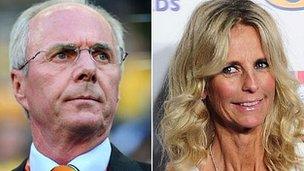Leveson Inquiry: Phone hacking 'possibly' behind Sven-Ulrika scoop
- Published
Mr Wallace said that hacking could have been the source of the Ulrika Jonsson story
A hacked voicemail could have been the source of a scoop revealing Sven-Goran Eriksson's affair with Ulrika Jonsson, the Daily Mirror's editor has said.
Richard Wallace told a media ethics inquiry that phone hacking "might well have been" taking place when he was showbiz editor under Piers Morgan.
Mr Wallace told the Leveson Inquiry he had no knowledge of hacking but said it might have been hidden from him.
Publisher Trinity Mirror has insisted its journalists work within the law.
Mr Morgan has previously told the inquiry he was "not aware" of phone hacking taking place when he was in charge.
The inquiry, chaired by Lord Justice Leveson at the Royal Courts of Justice in London, is currently looking at the culture, practices and ethics of the press in general.
Mr Wallace said he could not recall the source of the story about former England football manager Eriksson but said he had taken the "tip" - received within the showbiz department - straight to his predecessor as editor.
Mr Morgan had then confirmed it with TV personality Jonsson's agent.

The Mirror had become aware of the affair from a "tip" to the showbiz department, Mr Wallace said
Asked if it was possible it could have been obtained through phone hacking, Mr Wallace replied: "It's possible, yes."
Earlier, he was asked about the evidence of a former financial reporter who spent time in jail for writing about firms whose shares he owned. James Hipwell had suggested phone hacking was a "bog-standard journalistic tool" of the showbiz team when he was at the paper between 1998 and 2000.
Mr Wallace, showbiz editor for part of that time, said he had no knowledge of this but - asked whether it could have been hidden from him - accepted: "It might well have been."
'Human error'
About current standards at the Daily Mirror, Mr Wallace said: "Ethical issues are embedded within the culture of our newsroom."
However, he admitted to unintentionally breaking the Press Complaints Commission's editors' code "on occasion".
Mr Wallace was asked about an occasion when the Mirror ran a story based on an incorrect news agency court report alleging that a TV star had been charged with "unspeakable child porn offences".
He said: "The reporter made a mistake and no amount of tightening up of rules and regulation can stop human error."
Mr Wallace also used the hearing to apologise for the Mirror's reporting of the arrest of a man on suspicion of the murder of architect Jo Yeates.
Christopher Jefferies, Miss Yeates' former landlord, previously told the inquiry that the national press "shamelessly vilified" him.
"We obviously caused him and his nearest and dearest great distress which I regret, personally, greatly and I regard it as a black mark on my editing record," Mr Wallace said.
Later, Sunday Mirror editor Tina Weaver was asked about allegations of phone hacking at her paper made by the BBC's Newsnight programme.
"I don't believe it to be true," she said. "I think they know we're unhappy about unsubstantiated non-specific anonymous allegations from seven years ago presented as unearthing evidence."
'No evidence'
Trinity Mirror chief executive Sly Bailey said it had not investigated whether there was hacking at the group's titles following phone-hacking convictions at News International.
"It is not the way to run a healthy company to conduct investigations when there is no evidence to say our journalists have hacked phones," she said.
Sly Bailey appeared at the Leveson Inquiry into press ethics in January 2012
The BBC Newsnight report was a "terrible piece of "journalism," she said, adding that the programme had no evidence for its claims.
Meanwhile, the inquiry was also read a letter by lawyers acting on behalf of former prime minister Gordon Brown.
He said evidence by former Sun editor Kelvin Mackenzie, who claimed Mr Brown threatened to "destroy" News International during a phone call to Rupert Murdoch after the tabloid switched its political allegiance, was "untrue".
Prime Minister David Cameron set up the inquiry last July in response to revelations that the News of the World commissioned a private detective to hack murdered schoolgirl Milly Dowler's phone after she disappeared in 2002.
It is due to report on media ethics and cultures by September. The inquiry's second stage will examine the extent of unlawful activities by journalists, once detectives have completed their investigation into alleged phone hacking and corrupt payments to police, and any prosecutions have been concluded.